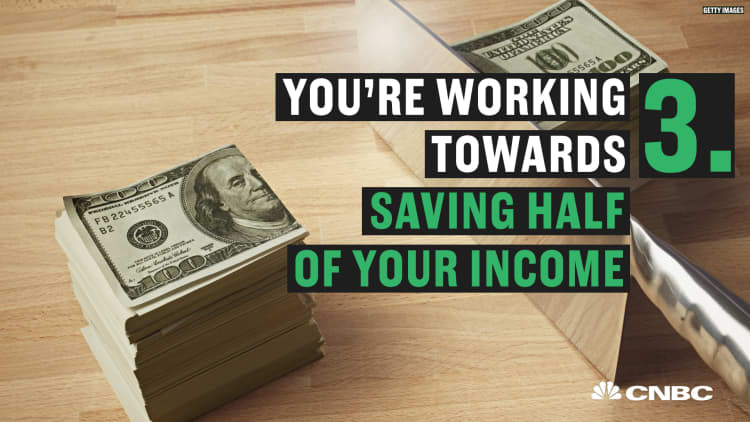Though the average American retires at age 63, a handful of outliers have cut that number nearly in half.
Take Justin and Kaisorn McCurry, who quit their jobs in their 30s after saving $1 million in a decade. Or Chris Reining, who became financially independent at age 35 and retired two years later.
Could you also be on track to settling down before the typical American? If these accomplishments sound familiar, you've got a good chance.

You track your expenses
Whether you track your purchases in a spreadsheet or use an app like Mint or You Need a Budget to do it for you, knowing how much you need to fund your lifestyle is crucial.
In fact, many early retirees started their journey to financial independence by analyzing their spending habits and figuring out exactly how much they needed to retire comfortably. "You have to know what you are spending before you can plan your retirement budget," says McCurry.
You've thought about your future lifestyle
If you can envision your future — whether it involves traveling, buying a vacation house or gifting money to family — you'll have a better idea of what your expenses in retirement will look like.
"This is probably the hardest part of budgeting for retirement expenses, as it can be difficult to think of what you want to do for fun for the rest of your life," says McCurry. But it's an essential part of creating a practical, realistic retirement budget.

You've set clear and specific retirement goals
If you've set a target date, you're on the right track to retiring early. You'll also want to make a retirement budget, which will help you figure out exactly how big your portfolio needs to be to last through your golden years.
Many early retirees use the "four percent rule" to help them determine how much they'll have to save.
You pay yourself first
When you earn a dollar, the first person you pay is you, meaning you consistently send a chunk of your gross income to a tax-advantaged retirement account, such as a 401(k), Roth IRA or traditional IRA. The earlier you want to retire, the greater the percentage should be.
Bonus points if you've automated your system, meaning you have money automatically taken out of your paycheck and sent straight to your savings, retirement or investment account.

You have more than one savings account
If you've considered alternate retirement savings accounts besides your 401(k) plan (a Roth IRA, traditional IRA and/or health savings account), you're ahead of the curve. As experts point out, relying on one savings vehicle may not be enough to fund your future.
Even better, you've considered investing money in low-cost index funds, which Warren Buffett recommends, and/or online-investment platforms known as robo-advisers.
You save half your income
Most early retirees have the discipline to keep a large chunk of their paycheck — often, more than half of it — thanks to a variety of strategies.
If you're working towards setting aside 50 percent of your paycheck, you're well on your way to financial freedom.

You think about money as something to invest
You don't just save money, you put it to work. As self-made millionaire Grant Cardone says, "the only reason to save money is to one day invest money."
This applies to any surplus money that comes your way. If you earn a raise, bonus, birthday check or small windfall, and direct at least some of it towards savings instead of planning trips or grabbing gadgets, you're doing something right.
You maximize your income
If you're thinking about ways to generate more income, in addition to saving a ton, you're on a good path.
As Reining tells CNBC, "At a certain point, you need to figure out how you can make more money, because that's really limitless. You're never going to get to zero spending, but you can always make more money, so once you get to a balance of spending that you're comfortable with, focus on pulling on that other lever that you have, which is making more money."
Increasing your revenue streams could mean finding a part-time job, starting a side hustle or establishing passive income.
Don't miss: 9 strategies to save a fortune, from real people who bank half their income




